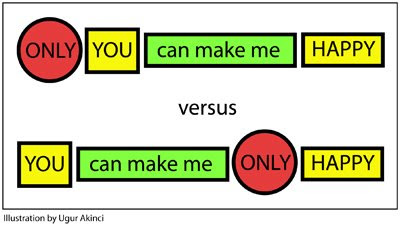
The Proper Way to Use "Only" in Your Technical Documents
In a technical document, the meaning of a sentence shifts considerably and sometimes dramatically depending on where the technical writer places the qualifier “only”.
Use “only” right next to the word that it qualifies.
EXAMPLE 1:
1) “The engineers only wanted to test the engine on a Saturday,”
is different in meaning than
2) “The engineers wanted to test the engine on a Saturday only.”
The first sentence means: the engineers wanted to do nothing more than just test the engine. For example, they did not want to paint the engine, or uninstall the engine on a Saturday.
Whereas the second sentence means: the engineers wanted to test the engine on a Saturday only; not tomorrow or not on January 4th.
EXAMPLE 2:
1) “I only increased the test load by 15% to check out the new Configuration Module.”
I only increased the test load. That’s all I ever did. I did not do anything else. I could have decreased the test load; or ignored it all together. Instead, I took only one specific action: I increased it.
2) “I increased the test load by only 15% to check out the new Configuration Module.”
I could’ve increased the test load by any percentage, from 0 to 100% and even beyond that. Instead, I chose to increase it only by 15%; not less, not more.
3) “I increased the test load by 15% to check out the new Configuration Module only.”
I could’ve increased the test load by 15% to check out the network capacity, or the cable connections, or the capacity of the client center to handle any increased phone calls. Instead, I chose to test the Configuration Module only.

The way you place “only” in a sentence changes the meaning of the sentence
EXAMPLE 3:
1) “He studies hard only to become a lawyer and work for Fortune 500 corporations.”
He could’ve studied hard to become an accountant or an engineer to work for Fortune 500 corporations as well. But instead, his effort is focused on becoming a lawyer and nothing else. He has no other future goal for himself.
2) “He studies hard to become a lawyer and only work for Fortune 500 corporations.”
He might have wanted to become a lawyer just to sue the Fortune 500 corporations. That might have been his motivation as well. But no, he has no intentions to do that since his only desire is to work for Fortune 500 corporations and to help them with their legal affairs.
3) “He studies hard to become a lawyer and work for Fortune 500 corporations only.”
After becoming a lawyer he wants to help the Fortune 500 corporations exclusively although he could’ve worked for the Federal Government, Mexican-American non-profits, or individual clients with trust funds as well. But no, he wants to limit his work as an attorney just to the corporations on the Fortune 500 list.
